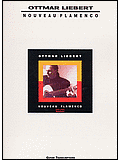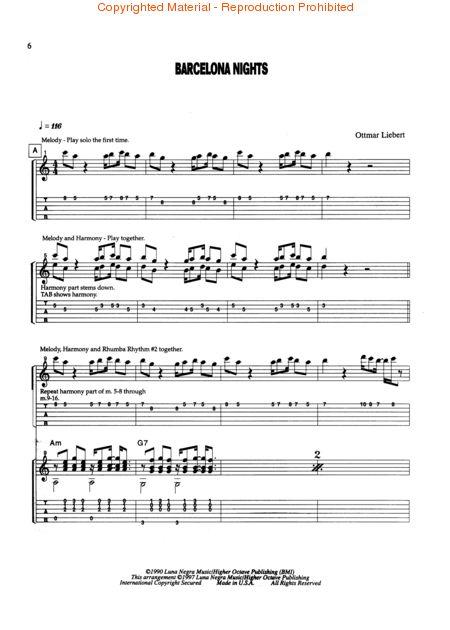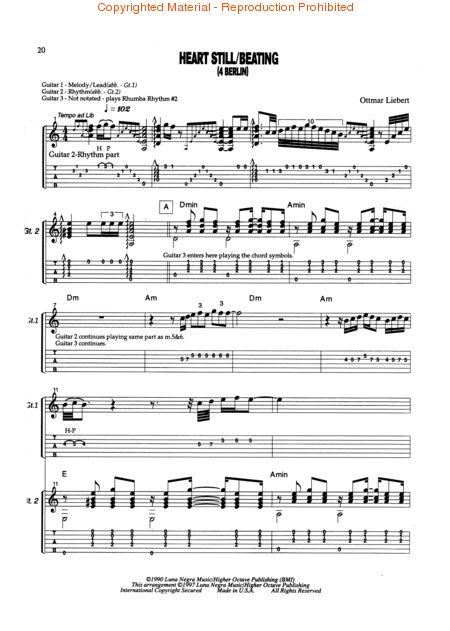LIEBERT OTTMAR-NOUVEAU FLAMENCO-TABLATURE SPARTITI CHITARRA LIBRO 2 the night-IL CICLONE-FILM
LIEBERT OTTMAR, NOUVEAU FLAMENCO. GUITAR TABLATURE
LIBRO DI MUSICA FLAMENCA.
SPARTITI PER CHITARRA CON:
ACCORDI, PENTAGRAMMA, NOTE, TABLATURE.
Il tema musicale del film di Leonardo Pieraccioni "il ciclone", 2 the night.
Artist: Ottmar Liebert
Guitar transcriptions to the album with 13 pieces, 72 pages
Liebert's albums have earned him a top spot on the New Age charts and more than three million listeners have purchased his recordings. He's played around the world to audiences in South America, Australia, New Zealand and Europe. He's done benefit concerts for Concerned Citizens for Nuclear Safety, the Dalai Lama and a group ofTibetan nuns mistreated by the Chinese government. He has opened for Miles Davis and plans a recording with a chamber orchestra and another with guitarist Eric Schermerhorn, who has played with The The and Iggy Pop. "The soul is the antenna, I am the instrument, the guitar is the amplifier," says the slender guitarist, who lives in Santa Fe, New Mexico. "I really feel that when I'm playing, it's an escape for me from my brain. I play from an emotional perspective." Liebert's spirited music is full of passion. Almost all of his songs are originals and without words, and they express universal and deeply personal sorrows and joys. "I'm trying to express something that to me is not easily conveyed by words," he said during a recent interview at Santa Fe's Cross of the Martyrs, a park that overlooks the city and mountainside where the Rockies begin. "Instrumental music to me is so much hipper. Words can be a coarse and fragile way to communicate. If you hear a song, no matter what the music is like, the words become the song. The words always take over. I want to get at this finer sense, where I think songs with words don't get to." It's not that Liebert dislikes the written word. In fact, he's named his band Luna Negra, after the Spanish poet Federico Garcia Lorca. Luna Negra blends layers of sounds with countermelodies, harmonies and intense guitar. It mixes ancient acoustic instruments like the sitar, lute, and drums with modern technology, like the MIDI flamenco guitar, which speaks a musical computer language. Born and raised in Cologne, Germany, by a Hungarian mother and a German-Chinese father, Liebert spent much of his childhood traveling through Europe and Asia with his family. As a youngster, he wanted to be an artist. "I spent a lot of time at the art museum in Cologne, which is a wonderful museum," he said. The work of Pablo Picasso impressed him because of the way the painter constantly changed his style, never sacrificing the quality of his work. But when he picked up the classical guitar at age 12, he unknowingly changed the course of his life. "I asked for a guitar for Christmas, and I got one," he said. "My parents figured I'd never do anything with it, so they gave me a cheap guitar. If I wasn't in school or sleeping, I was playing that guitar." The family didn't have a stereo, telephone or television, so there was plenty of time to work on his music. Eventually, he picked up the electric guitar and at 19, decided he wanted to be a musician. He left Germany to travel by himself through Asia, Russia and Europe, then came to the U.S. In Boston, he joined a band and hung out with musicians. But he grew tired of the East Coast and when a friend asked him to help drive a van cross-country, Liebert jumped at the opportunity. They passed through Santa Fe, and Liebert never left. "Something happened to me when I reached Santa Fe," he said, as the sinking orange sun washed the mountains in brilliant hues of gold, red and purple. "Santa Fe is in many ways responsible for my success." Liebert got a job working in a Santa Fe store and playing classical guitar in the evenings around town. With the help of Frank Howell, a Native American artist and gallery owner in Santa Fe, he made a recording that was sold during Indian Market, an annual Santa Fe event that draws thousands of tourists eagerly seeking pottery, blankets and turquoise jewelry. That recording made its way to several radio disc jockeys on the West Coast, and Liebert was then inundated with phone calls from record companies. "I was surprised," he said. "Some of them even wanted me to change my name and move to LA." Instead, he signed with Higher Octave Music, an independent label in California. The recording he made with Howell became Nouveau Flamenco, which has sold more than two million copies. His third Higher Octave Music CD "Borrasca" also reached #1 on Billboard's New Age Chart, reached Gold Status and was nominated for a Grammy. "Off" time finds him exploring the countryside by mountain bike or on foot. Tooling or hiking along, Liebert tunes in to the ever-fresh and surprising rhythms of Mother Nature. Like Her, his energies are not to be contained, his yearnings beyond the structures of organized religion. "I'm spiritual in an unorganized way," he muses. "I started reading avidly at 12 about religion and philosophy. My thinking has been most influenced by Buddhism and Taoism." "What matters to me is that this is where I am now, and so this is what I should concentrate on. I think that if everybody were to concentrate on this moment - rather than on past and future lives and moments - the world would be a lot better." Liebert's music reflects his philosophy of keeping life lively by not getting stuck in the same old habits, patterns or behaviors. "In one way, I play music so I can learn something from it. If I just did the same thing over and over, it would get boring. You've got to provoke yourself, put yourself in a situation where you do something totally new. If you don't, you will just be stagnant. If you play the same way all the time, you'll bore yourself and your audience. I want to take my listeners on a little journey, a trip of discovery." Liebert's style changes enough to have captured a varied crosssection of society. His fans include rockers, senior citizens, and just about everybody in-between. "It's something strange my music does," he reflected. "All of my music is international, it uses so many different cultures. People normally look at culture as being black or white, and are afraid of mixing cultures. But if people can come away from my concert feeling they've discovered another culture, they may actually like it. Not many people know, for example, that flamenco is a mixture of Gypsy, Indian, Arabic, Jewish and Spanish music." But Liebert never tries to convert his listeners. "I don't want to do any preaching," he said. "This is not a conscious process. I just see myself as being a conductor."
Well, maybe. But to us he's more like a magician who gives his audience a mystical experience of pure, earthly delights.
2 THE NIGHT (OTTMAR LIEBERT) - 1990
3 WOMEN WALKING (OTTMAR LIEBERT)
AFTER THE RAIN (OTTMAR LIEBERT)
BARCELONA NIGHTS (OTTMAR LIEBERT)
FLOWERS OF ROMANCE (OTTMAR LIEBERT)
HEART STILL/BEATING (OTTMAR LIEBERT)
MOON OVER TREES (OTTMAR LIEBERT)
PASSING STORM (OTTMAR LIEBERT)
ROAD 2 HER HOME (OTTMAR LIEBERT)
SANTA FE (OTTMAR LIEBERT)
SHADOWS (OTTMAR LIEBERT)
SURRENDER 2 LOVE (OTTMAR LIEBERT)
WAITING 4 STARS 2 FALL (OTTMAR LIEBERT)





